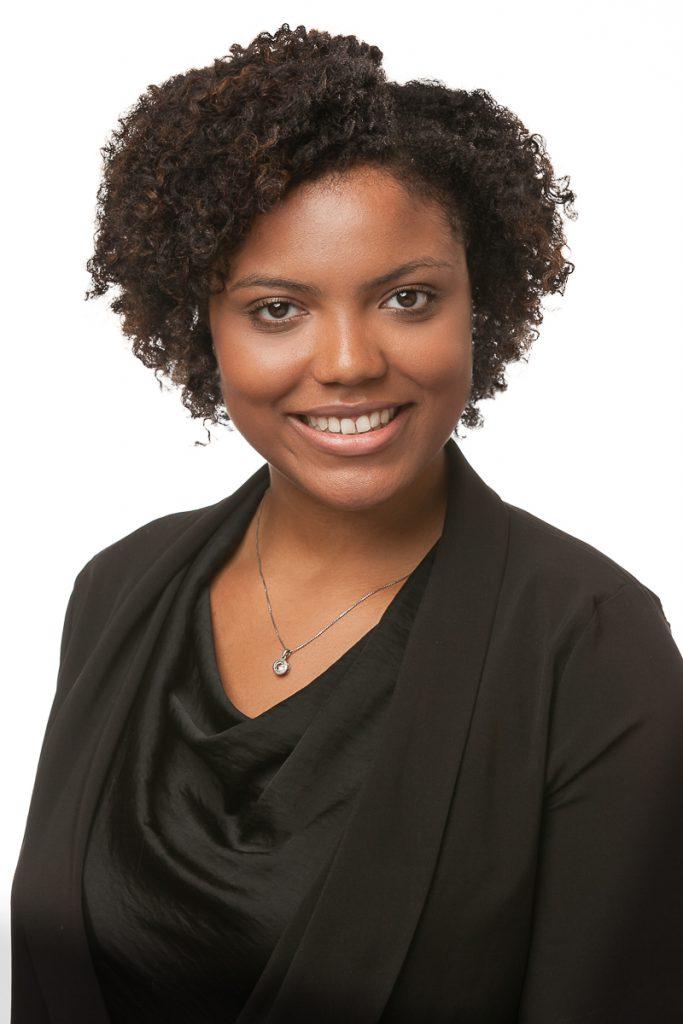Sevetri Wilson is a serial entrepreneur, founder, author, speaker, change agent, and wealth creator dedicated to helping others tap into their potential and achieve their highest goals. Some people you hear about and know they are true community builders identifying opportunities for and creating unique value for people, communities, and ecosystems. I knew this was Sevetri Wilson the minute I learned about her work building and sharing impactful resources.
This was confirmed during our vibrant discussion during which she made a point to mention the free resources anyone can download on her personal website including a pricing sheet template she created for her her business years ago, a capabilities statement outlining competencies she used to propose her own company’s services to government, and even her current startup’s investor deck including her pitch to investors.
Sevetri bootstrapped her first company, Solid Ground Innovations (SGI), a company encompassing all of the areas of service that charitable organizations and individuals seeking to do incredible deeds would need, to a 7-figure company. She later transformed the nonprofit arm of SGI into a tech startup which she has raised over $11 million for thus far.
Resilia is a technology platform with a human touch helping nonprofit organizations increase capacity and enable funders that deploy billions of dollars to scale impact. Her company’s focus on supporting do-gooders to maximize their time and output is another testament to her giving character. In her new book, Resilient: How to Overcome Anything and Build a Million Dollar Business With or Without Capital, she gives even more. She’s sharing private journal entries and describing her journey from self-funding to venture capital success
Her Agenda sat down with Sevetri to discuss what it means to be resilient, the changing landscape of philanthropy, and her new book.

Her Agenda: When I think of your work the word community encapsulates a lot of what you do and are. You have shared openly about the influence growing up in the deep south has had on your work and life. How has shaped your journey?
Sevetri Wilson: Growing up in the South in Louisiana about 45 minutes outside of New Orleans, I grew up in a rural area. My mother is from New Orleans. My dad is from Hammond, Louisiana. Oftentimes people don’t talk about rural poverty and what it means to grow up in a rural area as much as they discuss what it means to grow up in an urban area. Where I grew up you didn’t have public transportation, the library was very small, and you didn’t have access to the newest technology, books, and many other things.
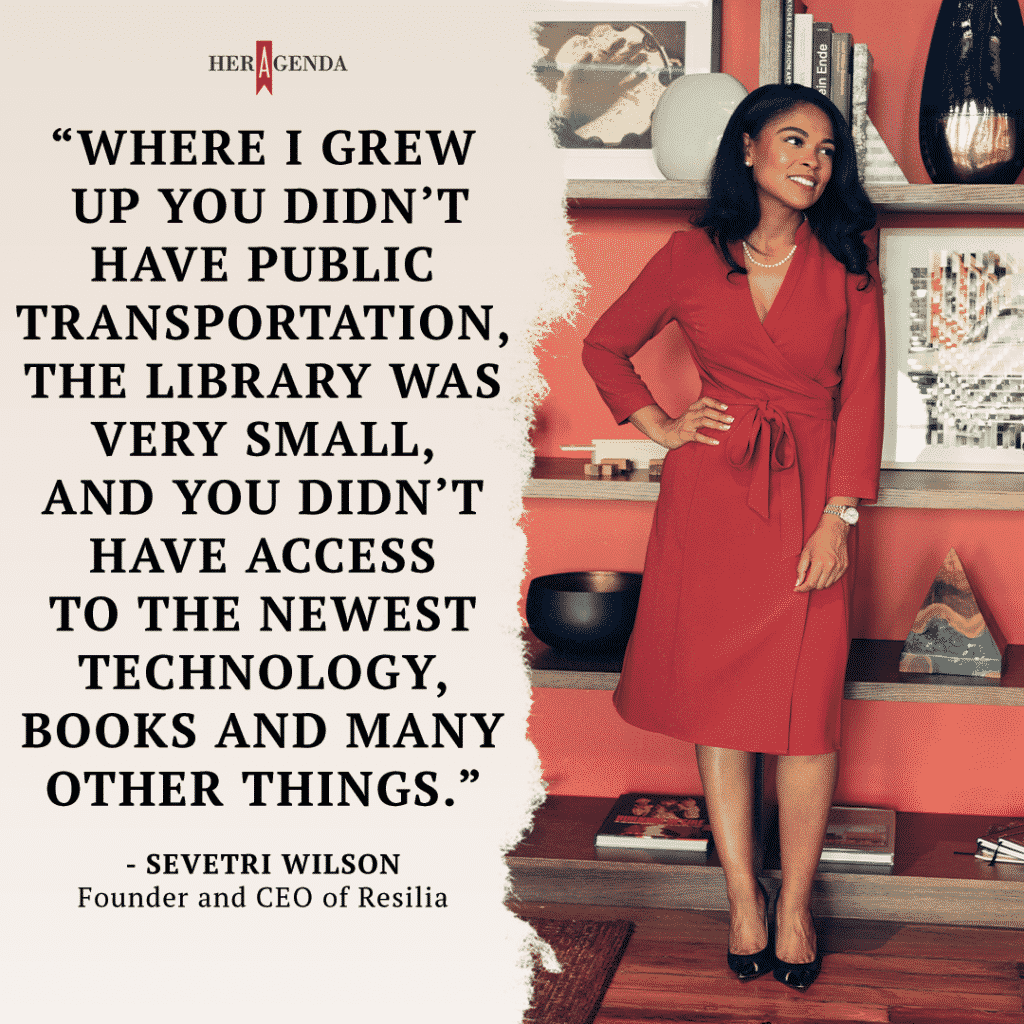
And so I really do think growing up in a small mostly rural town laid the foundation for me to build anything. I wasn’t exposed to a lot so I didn’t have anything to shape what I thought I could do. Many people think not having exposure hinders you from things which it definitely did but it also gave me the opportunity to have the imagination to create anything.
Her Agenda: How would you describe your career path up until founding Resilia?
Sevetri Wilson: My career path has definitely not been traditional and not been a straight line. When I graduated from undergrad I went to grad school thinking I was going to be a professor. I wanted to teach history like the professor who had impacted my life and taught me everything I knew up until that point about what it meant to be Black in America and what it meant to be African American. I double-majored in history and mass communication. I thought I would create documentaries and fuse my love for history and journalism together. Obviously, that is not what I’m doing! Instead, I started working for a nonprofit called CASA (Court Appointed Special Advocates). Their national office is in D.C. and I was working in their Louisiana office as an AmeriCorps VISTA. That led me down my path working with nonprofits.

I had the opportunity to work for amazing athletes who went on to start their own foundations and philanthropic outlets. They hired me to essentially help them build out their curriculum design, create their mission and decide who they gave money to. That opportunity allowed me to build my first company Solid Ground Innovations, a strategic communications and management agency with an arm focused on nonprofit organizations. That was the beginning of my career before starting Resilia.
Her Agenda: You previously founded a company that you bootstrapped and authored the book, Solid Ground: How I Built a 7-Figure Company with Zero Capital. What advice would you give to founders who might be looking to do the same? What are the benefits and challenges of doing so?
Sevetri Wilson: Most people would say you raised over $10 million in venture capital now so don’t tell us to bootstrap when you’ve raised that much money. However, I am such a big proponent of bootstrapping. I actually miss the idea of not having an investor, a board and all of these other people you have to report to when you start raising capital. I bootstrapped my first company, a professional services agency and because it was we were able to stay lean. Unlike a startup building technology we were able to grow based on these contracts we were delivering. When I think about individuals looking to bootstrap their company, they have to ask what is my lowest barrier to entry, what will it take to get this off the ground, what resources do I have to have to do it, and how do I get the resources I need? Oftentimes people look all the way to the end and think I can’t do this. You are looking too far down the road. What can you do today to get going?
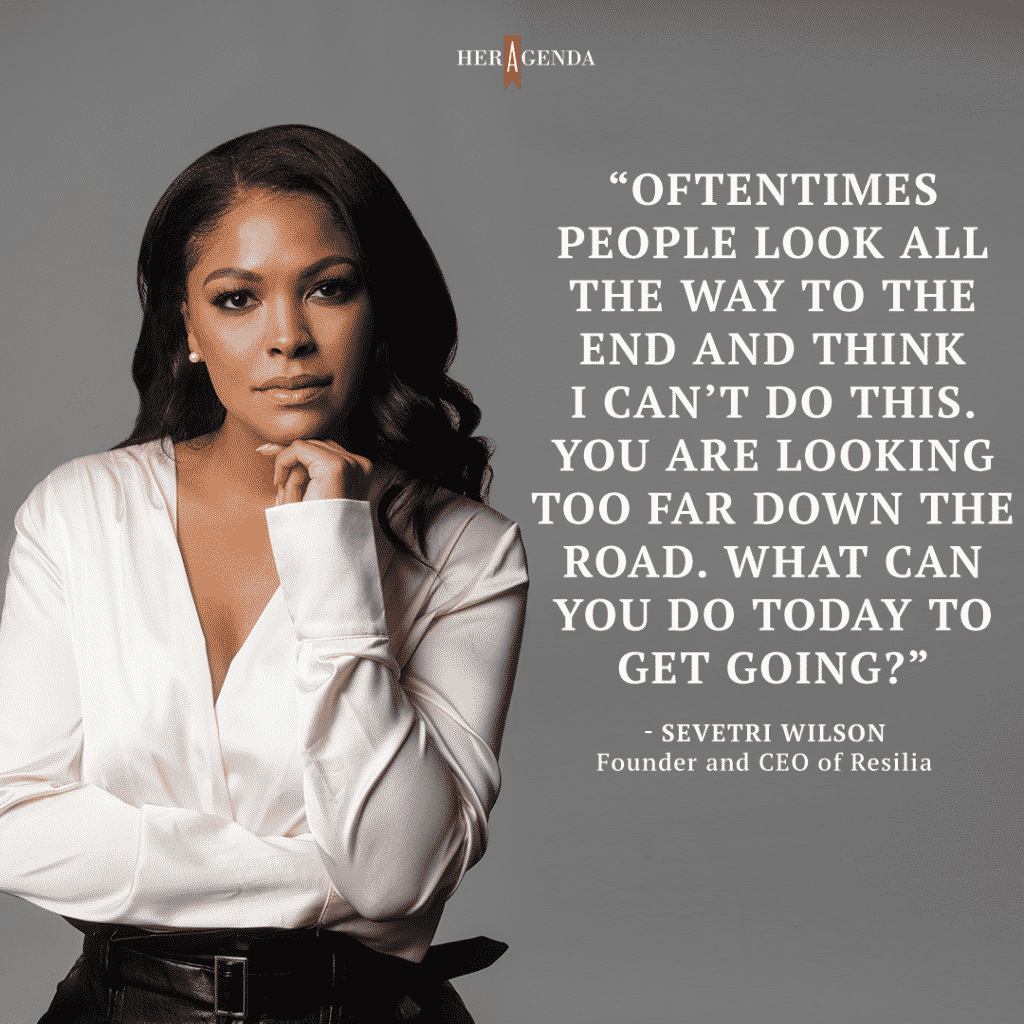
Her Agenda: Switching gears a bit to discuss your company and recent projects, what inspired the launch of Resilia in 2016, and how has the company shifted over the years, if at all?
Sevetri Wilson: I was a consultant through my first business and I was working with these nonprofits as well as these large funders and philanthropists. On one side with the funders, we were deploying capital to initiatives to support the nonprofits and through large vehicles like the Kellogg Foundation and family foundations we were providing technical support or capacity to the organizations they were funding. On the other side, we were working as the back office support for existing smaller nonprofits in lieu of full-time employees. I started looking at the tech that existed in our space, what wasn’t present, the silos that existed, and the work we were doing. We knew as soon as we left that work was not going to continue. We knew there were all these different barriers and at the same time observing how tech was disrupting all of these sectors and I truly felt that our sector was very antiquated, dated, and reluctant to use technology although we could benefit from it. That was what inspired me to start Resilia. I thought how can I productize my consulting services and deliver them through a software solution and do so in many ways on demand.
-Sometimes we split our time between too many projects and instead of having one thing that is really successful we have a lot of things that are mediocre.
Her Agenda: Having worked in the space of helping companies secure large contracts and opportunities with funders and governments, I know firsthand how difficult it can be to both pursue and manage these opportunities. What is your hope for those leaders running organizations and the funders proving capital over the next few years?
Sevetri Wilson: Darren Walker who is leading the effort to break up the old boys’ way of doing philanthropy says it is time to get uncomfortable and start doing things differently than what we have historically done. He has stepped up to the plate to actively implement those things. Then there are others who are trying to figure out what works for them. Ultimately what we are trying to do for our funders and philanthropy, in particular, is democratize it and make it more accessible to more organizations. For most organizations that are not on the receiving end of funding you think there’s a shortage of money. We know that is not the case.
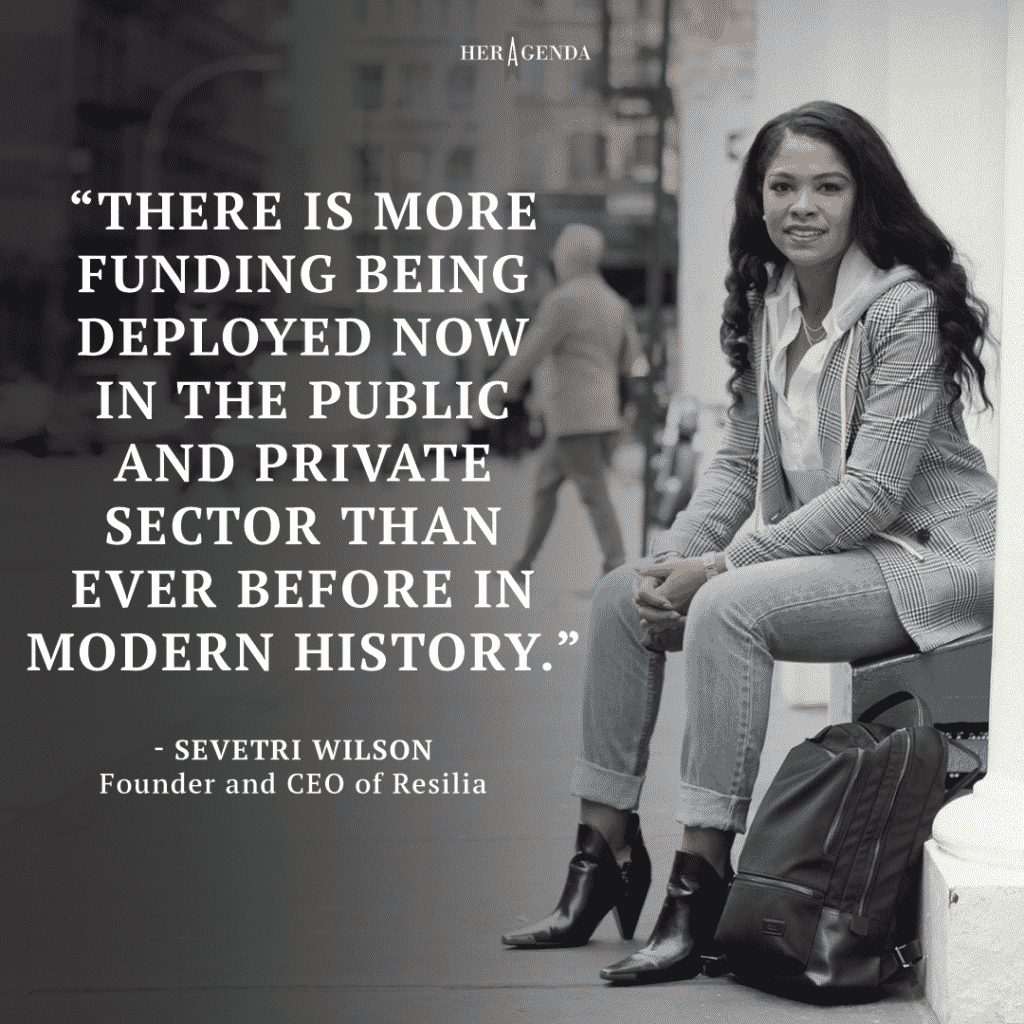
There is more funding being deployed now in the public and private sector than ever before in modern history. There isn’t a shortage of capital, there’s an inequity in who receives the capital. When we think about philanthropic dollars 47% of the organizations that received philanthropic dollars are led by people with an ivy league degree. 11% for organizations led by people of color, 18% for those led by women. It is ridiculous. There is inequity in how philanthropic dollars are being deployed and I believe that funders should be charged with breaking up that dynamic and ensuring that support being provided is equitable.
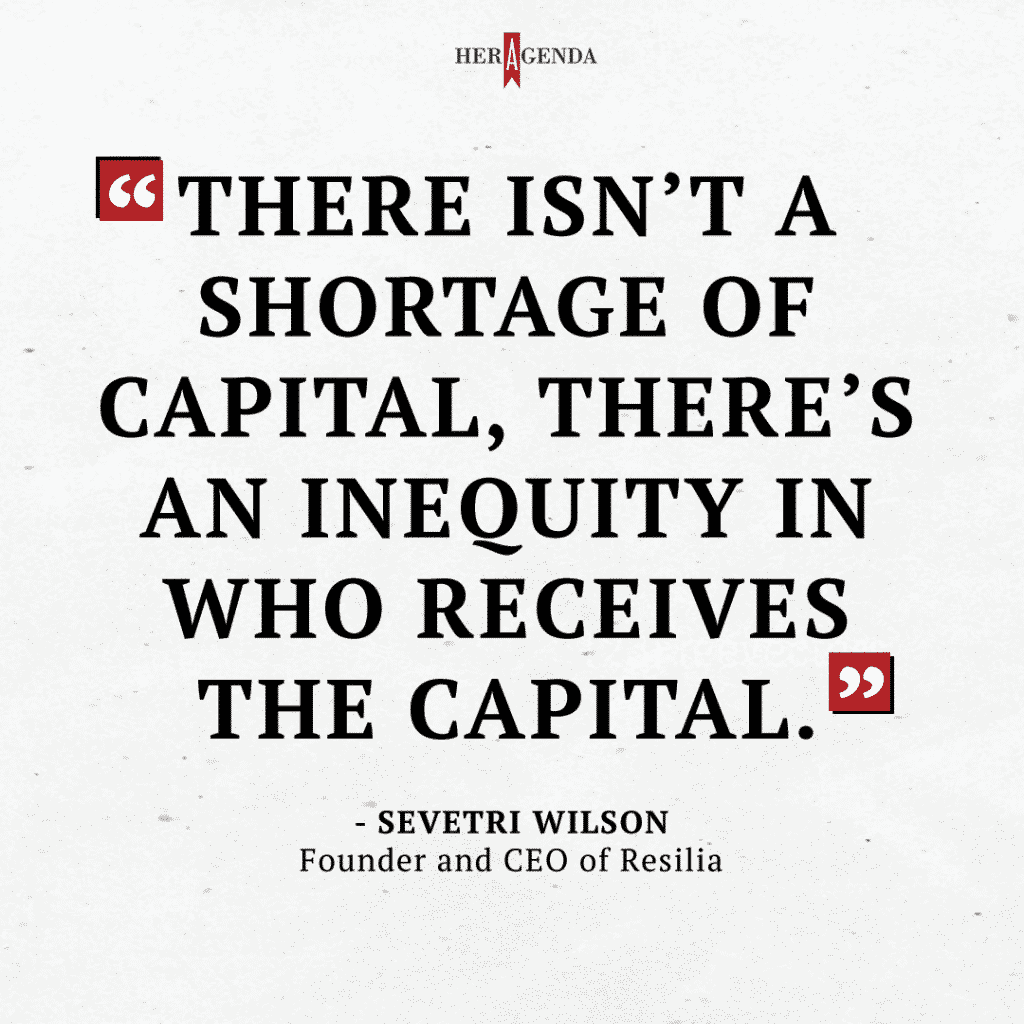
Her Agenda: When we think about foundations, governments and entities across various sectors there is an acknowledgment that they deploy capital out so differently. What does it look like to solve this complex problem around process and decision-making?
Sevetri Wilson: Contrary to popular belief, most funding nonprofits receive are secured through contracts whether that’s government or contracts with other entities. In many ways, we have to demystify what that means and how to access it. On the other hand, we also have to empower our states and municipalities to be able to break up all the barriers you have to navigate to access capital as well. If you’ve ever worked inside of a city or local government you know it is challenging. When we think about antiquated technology, how information and data are collected we have to do better in order to build strong communities. We do have to align more on how we are getting money to the organizations that do the work.
I also believe in this idea of one app type of system. Why does a nonprofit have to reapply to all these different funding sources and jump through all of these hoops? Why can’t they choose one streamlined form or application that they fill out and put their best foot forward? Then organizations can read that to determine whether or not they receive funding? There are so many ways we can streamline processes and make things more accessible, equitable and remove the red tape that exists so that we can begin to transform our communities for the better. The system does not work. Can we all agree on that? Let’s begin to do things that make it work for everyone and not just certain people who have understood how to access it.
-The system does not work. Can we all agree on that? Let’s begin to do things that make it work for everyone and not just certain people who have understood how to access it.
Her Agenda: You recently released, Resilient: How to Overcome Anything and Build a Million Dollar Business With or Without Capital. What is your hope for those who read this book?
Sevetri Wilson: I want to go back to where we started this conversation of how my journey was impacted by where I am from. I often feel that people think if I don’t exist over here, if I don’t go to Silicon Valley, if I don’t look a certain way, if I don’t take this path then I can’t have success. In the book, I wanted to provide a guide on how I raised my first round of capital, how I started my first business, how I secured contracts, and all of these aspects. I also wish to provide an inspirational story about how if I, Sevetri Wilson, from the South, a solo founder, and first-generation college student can do it then you certainly can do it too. Nothing is unattainable.
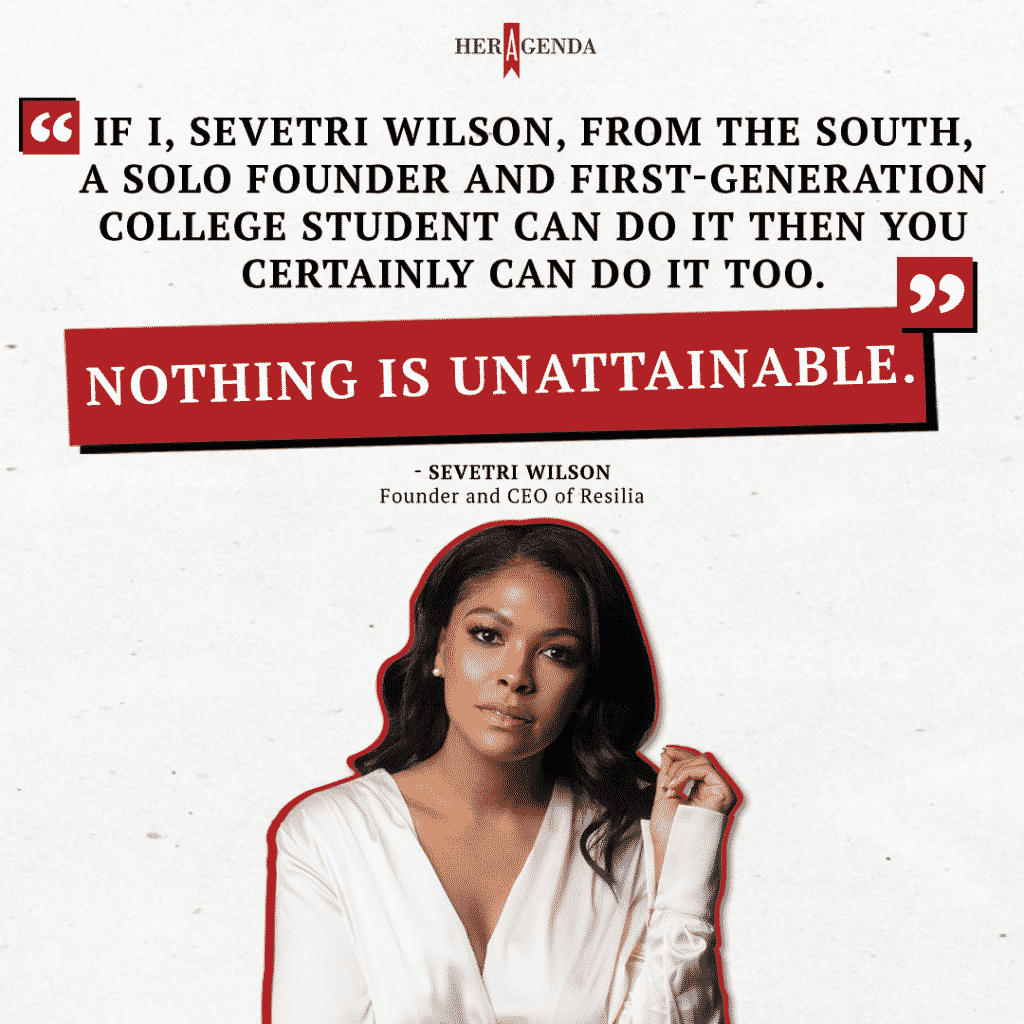
Her Agenda: You were a successful founder at the age of 22 building a 7-figure company, what advice or words of encouragement would you say to a young woman who’s building a company now?
Sevetri Wilson: You have to put the right people around you. It doesn’t mean physically putting the right people around you. For example, I wasn’t a big person on Twitter and then when I started raising capital I joined Twitter and realized there was a whole world of tech on Twitter. There is so much information out here and I always say I am a sponge of information. I absorb what I need and release the rest. What is the information you are absorbing? Who are the people around you? Also, what do you tell yourself? All of these things are the foundation that matters when you think about starting and growing a business.
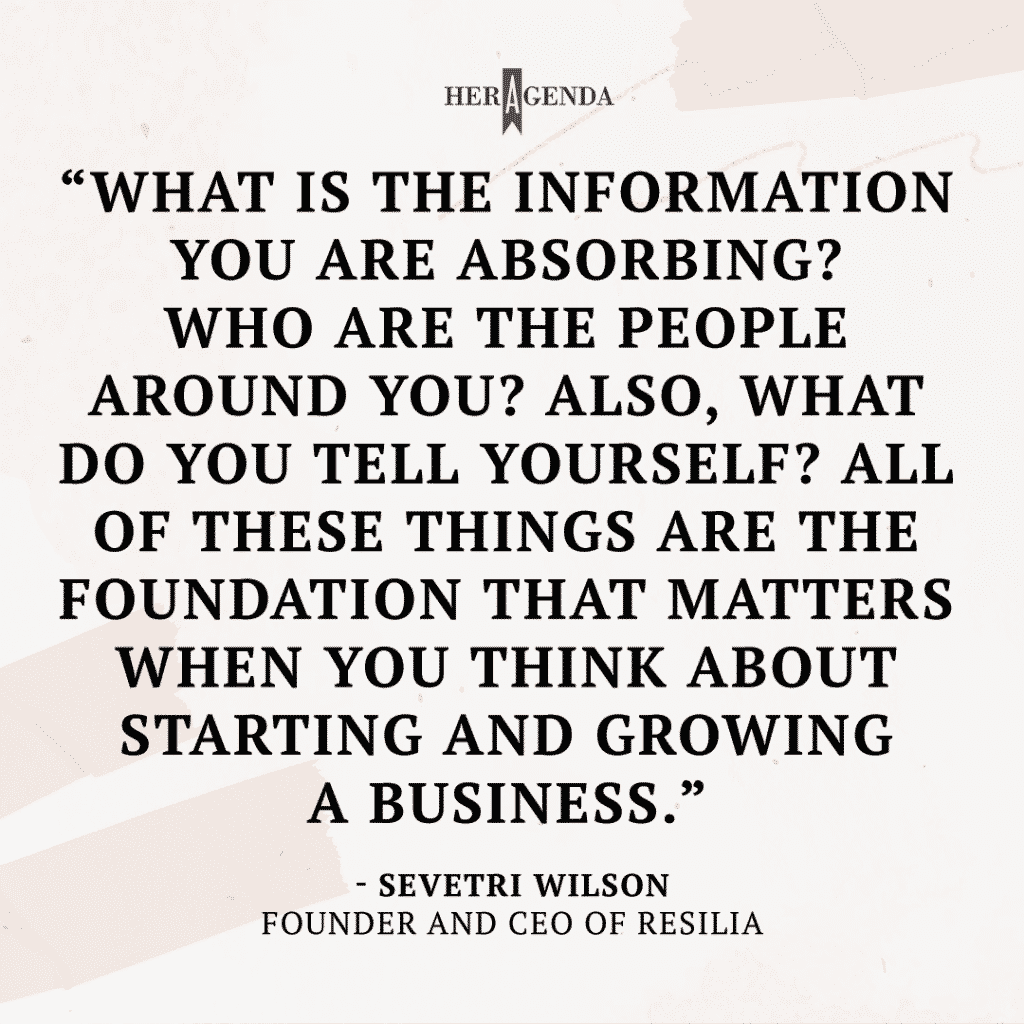
To gain the momentum that you need to get it going you have to be relentless or as I like to say resilient. Oftentimes people give up too soon. I’m a living testament that one interaction, one introduction, and one conversation can change your life. Never feel like anything is out of reach but you also have to put into play the things that you need to do in order to move your business forward in a sustainable way. Often for women and women of color, we may be building businesses but we’re not necessarily making money. We have to flip that so that we can open up a whole new realm of opportunities for ourselves and our families.
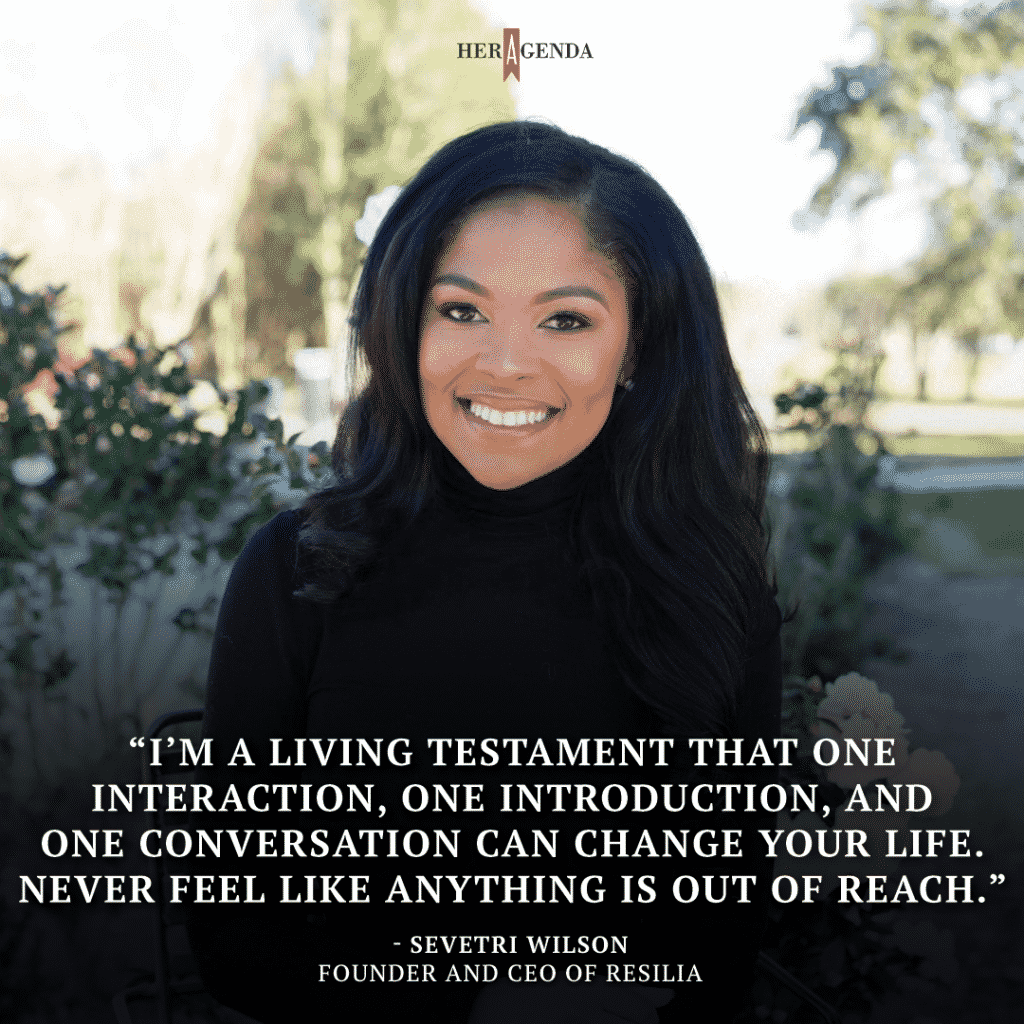
Her Agenda: What is the best advice you’ve ever received?
Sevetri Wilson: The best advice I have received over time has been around what actions to take, having discernment and a way to figure out what is it that I’m trying to accomplish and how can I really focus my time and attention to that thing first and then do all the other things I’m passionate about. People ask me how I’m doing all of these things now. To be honest, for the first almost 10 years of my career I focused on mostly one thing. I stayed focused on the thing that I know would allow me to afford the ability to do other things. Sometimes we split our time between too many projects and instead of having one thing that is really successful we have a lot of things that are mediocre.
Her Agenda: What is currently on your phone screen?
Sevetri Wilson: This has been on my home screen for years but it says ‘You can do this. Pray.’
[Editor’s note: This interview has been edited for length and clarity.]




